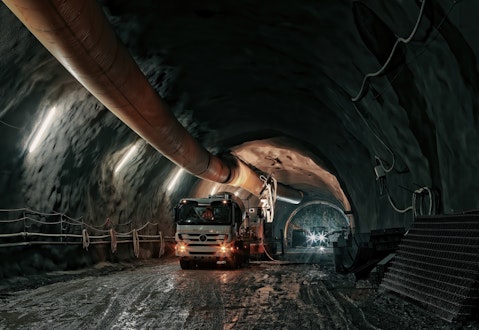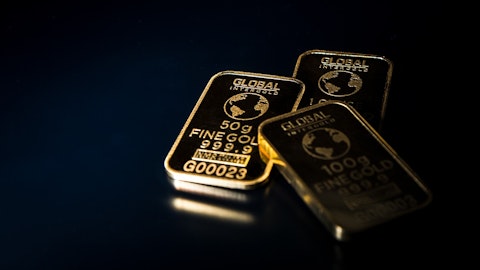Kinross Gold Corporation (NYSE:KGC) Q1 2023 Earnings Call Transcript May 10, 2023
Operator: Good morning, my name is Rob and I will be your conference operator today. At this time, I would like to welcome everyone to the Kinross Gold First Quarter 2023 Results Conference Call and Webcast. All lines have been placed on mute to prevent any background noise. After the speakers’ remarks, there will be a question-and-answer session. [Operator Instructions]. Thank you. Chris Lichtenheldt, Vice President Investor Relations, you may begin your conference.
Chris Lichtenheldt: Thank you and good morning. With us today, we have Paul Rollinson, President and CEO; and from the Kinross Senior leadership team, Andrew Freeborough, Claude Schimper, Ned Jalil, and Geoff Gold. For a complete discussion of the risks and uncertainties, which may lead to actual results differing from estimates contained in our forward-looking information, please refer to page 3 of this presentation, our news release dated May 9th, 2023, the MD&A for the period ended March 31, 2023, and our most recently filed AIF, all of which are available on our website. I will now turn the call over to Paul.
Paul Rollinson: Thanks, Chris. And thank you all for joining us. Today, we will discuss our first quarter results, provide updates across our portfolio, confirm our outlook. And I will make some comments on our ESG initiatives. Our first quarter performance was on plan with all our operations performing well and production accounting for approximately 22% of our full year guidance. Worthy of note is that Tasiast, Paracatu, and La Coipa contributed approximately two-thirds of our production, with strong margins and cash flow, and all remain on track to achieve their full year targets. Following our strong first quarter results, we remain on track to achieve our 2.1million ounce production guidance for this year. In Q1, we also made good progress at Tasiast, La Coipa, and Great Bear projects.
Beginning with the Tasiast 24K expansion, in February, we successfully completed the plant shut down for tie-ins related to the front end of the plant. We have another shutdown scheduled in June, to continue the tie-ins around the back end of the plant. The project remains on schedule and is progressing well. At La Coipa among other things, our focus was on driving strong recoveries in Q1, which I’m pleased to report are outperforming expectations. Production at La Coipa is also on track to achieve full year guidance. At Great Bear we completed almost 40,000 meters of drilling largely focused on exploring and ultimately expanding our underground resource. As predicted, we continue to hit high grade mineralization with large widths in several areas to a depth of 1.3 kilometers, confirming our thesis that this orebody continues well below the open pit.
Studies, permitting plans and project staffing initiatives are progressing well. And we remain excited about unlocking the tremendous potential this project offers over the coming quarters. In addition to strong production from our operations, and steady advancement of our projects, our business is generating strong cash flow. In addition to strong cash flow, we have a strong investment grade balance sheet. And as a result, we plan to continue returning capital to our shareholders while further de leveraging our balance sheet. Finally, I’d like to comment on ESG. ESG is ingrained in all aspects of our business and is embedded in our culture and core values. I’m pleased to say that Kinross continues to rank well among our peers in major ESG rankings and ratings.
We also recently updated our ESG strategy, focusing on the following three core pillars, workforce and community, natural capital, and climate change and energy. In addition, we strengthened our ESG governance structure, including quarterly reporting, by our ESG executive committee to our Board of Directors. Yesterday, we released our sustainability and ESG report, which is now in its 15th year. The report provides a comprehensive update on the progress we made in 2022 and what we aim to achieve in 2023 and beyond. Some specific highlights of our achievements from our report included. With respect to safety, our number one priority, we continue to roll out our new Safety Excellence program to all employees and business partners, following the successful launch of the initiative at Tasiast in 2022.
Safety Excellence is a holistic program that focuses on our people to better achieve strong performance across all leading indicators of safety. In 2022, we generated nearly $3 billion in economic benefits to host countries through taxes, wages, procurement, and community support. At our operations, we sustained high levels of local employment with 99% of our workforce, and 87% of our management from within host countries. Throughout our company, we advanced diversity, equity and inclusion targets, achieving the highest percentage of female participation in our workforce in the last five years. I’m pleased to report that we have once again ranked highly in the global mines annual corporate governance review. And this year, we’re in fact the highest ranked mining company survey.
Recently we received the Alaska Miners Association’s Environmental Stewardship Award, which we were nominated for by our NGO partners. For best management practices as part of the abandoned mine initiative. This is an initiative where we are working together with our NGO partners to restore river habitats impacted by historical placer mining. With that I’ll now turn the call over to Andrea.
Andrea Freeborough: Thanks, Paul. This morning, I’ll discuss financial highlights from the quarter, provide an overview of our balance sheet and capital allocation program and comment on our guidance and outlook. As Paul noted, first quarter production was on plan, we produce 466,000 ounces, reflecting seasonality in our business. And the plan shut down at Tasiast and La Coipa during the quarter. Sales were 490,000 ounces which were higher than production due to the timing of ounces sold in particular at Bald Mountain. In Q1 cost of sales was $987 per ounce, slightly above our full year guidance midpoint. And as we expected, given Q1 was a lower production quarter. Cost of sales outside of the U.S. averaged below $800 per ounce, despite a shutdown at Tasiast and seasonally low production at Paracatu.
Q1 cost of sales was particularly high at Round Mountain as we progress through the higher strip in Phase W2 coupled with the lag effect of the inflation we experienced last year. While our all-in sustaining cost was $1,321 per ounce in q1 reflecting activities at our U.S. assets. Our cost performance outside of the U.S. was strong, with an average ASIC just over $1,000 per ounce. CapEx was $221 million in Q1. Free cash flow was $38 million or $137 million excluding working capital changes. As a reminder, Q1 was expected to be a lower free cash flow quarter given the production seasonality as well as the timing of certain payments. Our adjusted earnings per share was $0.07 and adjusted operating cash flow per share was $0.29. Turning to the balance sheet, our financial position remains strong and is expected to improve as we progress through this year and beyond.
We ended the quarter with $471 million in cash and approximately $1.7 billion of total liquidity. Our trailing 12-month net debt to EBITDA ratio improved slightly as at quarter end of 1.65 times. Our next debt maturity is in March 2024, when we have $500 million of senior notes coming do, we expect to refinance those notes this year. Turning to our capital return program. As Paul noted, this year we plan to continue paying our quarterly dividend of $0.03 per share. Our share buyback program also remains in place which would have its repurchasing shares in the second half of the year. Following Q1, we are on track for production and cost guidance. In Q2, we expect a production uplift, followed by a stronger second half overall based on ongoing ramp ups and favorable seasonality.

Photo by Ricardo Gomez Angel on Unsplash
On inflation, we have factored a 5% increase in our cost guidance for this year, relative to full year costs in 2022. As of today, we still believe this is a reasonable estimate. So far this year, oil has been trending somewhat favorably relative to the $90 per barrel assumption within our guidance. However, this has been offset by higher gold prices, which bring higher royalty costs. Capital expenditures are on track and expected in the range of a $1 billion for the year, roughly evenly between sustaining and non-sustaining items. In summary, we are reaffirming our full year guidance for production in the range of 2.1 million ounces, cash costs of $970 per ounce, and all in sustaining costs of $1,320 per ounce. I’ll now turn the call over to Claude to discuss our operations.
Claude Schimper: Thank you, Andrea. This morning I’ll provide a brief update of our operations. We saw a strong performance from our operations in Q1 with all of our mines achieving planned production. Approximately one-third of our production came from the U.S., whereas anticipated costs were elevated. The mines are achieving their targets and we expect cost to come down in the next couple of years as temperature decrease and grades improve. In addition, we are successfully executing on projects at Fort Knox and Round Mountain, which we expect to provide higher grade higher margin production in the future, helping drive down the costs in the U.S. Our assets outside the U.S. accounted for approximately two-thirds of production and delivered strong cash flow for the company with an average cost and $800 an ounce.
At Tasiast, we had a strong quarter, continue to account the planned downtime for the reason times with production of 131,000 ounces, and cash costs of $688 an ounce. Tasiast continue to successfully ramp up with both January and March achieving record monthly production of around 55,000 ounces. Our major plant shutdown in February to install a new vibrating screen as part of the 24K project was completed successfully. In addition, we use the shutdown as an opportunity to make other improvements to sustain higher recoveries with increased grades and throughput. The project remains on schedule to reach throughput of 24,000 tons a day by mid-year, followed by a ramp up to sustain the throughput by the end of the year. We will remain on track to meet our 2023 Production guidance of 610,000 ounces.
At La Coipa, production is tracking well against our plans. A strong performance on grade and recovery is offset lower throughput goes by plant most shutdown to further enhance reliability. La Coipa produced approximately 54,000 ounces at a cash cost of $727 an ounce, adding a third highest margin strong cash flowing asset to our portfolio. We expect La Coipa throughput to continue improving throughout the year. And we are on track to meet our 2023 production guidance in the range of 240,000 ounces. At Paracatu, Q1 production will seasonally lower as expected. However, year-over-year production was higher on the back of successful exits at the site to minimize the impacts of the rainy season. The market uses 123,000 ounces at a cash cost of $919 an ounce and was slightly ahead of plan due to stronger grade and recovery.
We expect Paracatus production to ramp up in Q2 and Q3 on the back of increase mining rates in the higher grade deeper areas of the pit in the South West. Now moving to our U.S. operations. Fort Knox, Bald Mountain and Round Mountain are all on track. Cost of these assets are higher relative to the rest of the portfolio and will remain so for the balance of the year, but are expected to decline over the coming years. Beginning with Fort Knox as planned Q1 production of 65,000 ounces, was lower quarter-over-quarter due to the seasonality of the heap leaches. That was up year over year on the back of record or stacking on the leach pads last year. We also saw strong performance from the mill and a benefit from some unplanned ore encountered in our [indiscernible] stripping.
We continue to progress work on no modifications for the Manh Choh project at Fort Knox and expect costs to decrease over the coming years as a high grade Manh Choh ore starts going through the mill and our strip ratios in Phase IX and Phase X decline. At Bald Mountain, we achieved our planned production for the quarter despite the weather challenges. Next I’d like to go into a little bit more detail at Round Mountain. In Q1 production was higher year-over-year due to higher ounces onto the leach. Our more recovery in grade also outperformed our plan in Q1 with the recovery outperformance partially driven by bringing the flotation expansion online earlier than expected. As Andrea mentioned, cost of sales at Round Mountain were higher in Q1.
We expect costs around to remain elevated through the as we mined the highest stripping benches of Phase W. Cash costs are expected to decrease next year with lower strip ratios and improved grade as we mined the lower benches of Phase W. Looking further ahead, we started construction on our underground exploration declining the quarter, which will allow underground drilling by early next year. With that I will now pass the call over the Ned.
Ned Jalil: Picking up where Claude left off, I’ll start by elaborating on Round Mountain, then comments on our Manh Choh and Great Bear project. At Round Mountain, we are continuing to focus on progressing the higher margin underground opportunities at Phase X and Gold Hill. As Claude mentioned, we are currently progressing our underground declined and expect to start definition drilling in early 2024. We expect to be able to complete the definition drilling of the new zone of the ore body by the end of 2024. In parallel, we are progressing studies and permitting in order to advance our path to first production. Our preliminary view is this has the potential to be a high productivity, lower costs underground operation given the wide and consistent nature of the mineralized zones.
That typically intercept suggests, with averaging well above 10 meters a grade of three to four grams per tonne. At Gold Hill, which is located seven kilometers away from Round Mountain, we continue to focus on surface exploration drilling, and progressing permitting for an exploration drill. Our drilling intercepts are just a series of narrower but higher grade parallel widths extending from the Gold Hill open pit. We are currently observing one to three-meter width above six grams per tonne. Mineralization extends over 1,000 meters along strike. We envision a lower production but higher grade satellite mine at Gold Hill that would supplement the Phase X underground ore free and benefit from synergies of the combined operations. Gold Hill has the potential to contribute two to three years after we start production at Phase X.
Stepping back to look at the big picture at Round Mountain, the transition from open pit to underground mining presents the opportunity for us to mine higher margin ounces through the end of this decade and into the next. We remain excited about the future at Round Mountain and look forward to providing more detail over the coming quarters as we advance our work. At Manh Choh, activities remain on schedule and on budget. With the early works programs successfully completed, the camp is now operational supporting ongoing construction activities. The public comment period for the operating permits has now closed. The overall process is progressing well. Initial production for Manh Choh is on scheduled to commence in the second half of 2024. We are excited about bringing in this high margin project into production next year, as it will secure several years of increased production with lower costs at our Alaskan operation.
I will conclude by giving an update on Great Bear. In the first quarter we drilled approximately 40,000 meters and continue to progress our exploration program with 11 drills currently operating on-site. As Paul mentioned, we are pleased to see our thesis playing out, as we now have several significant intercepts between depths of 500 meters and 1.3 kilometers. Confirming our view, the ore body continues well below our initial open pits resource, and indicating the potential continuity of high grade ore chutes and depth. For example, Hole BR-695, our deepest intercept yet showed 9.6 meters’ druid of 10 grams per tonne gold at a depth of 1.3 kilometers. As we move into the summer, we will ramp up our regional exploration on the property, prioritizing extensions of the LP to the northwest and southeast, and for additional hinge and wind style targets.
In addition to exploration drilling, we took the opportunity to drill areas where future infrastructure is planned. Activities outside of exploration are also progressing well. We continue to advance technical studies and permitting activities. We’re planning to release the results of this work through a PEA next year. Permitting activities for the advance exploration decline are well underway. The initial project definition has been submitted to the Ministry of Mines, and an interagency alignment meeting was held with the various ministries that will be involved in the permitting process. Engineering is progressing well on the surface layout and design for our portal. Field activities, including soil and geotechnical drilling are also underway and progressing well.
In addition, we recently acquired 2700 hectares of land adjacent to our project and entered in an option agreement to potentially acquire a 70% interest in a further 16,000 hectares. This new ground will provide optionality for infrastructure placement, as we progress our studies and may also introduce incremental exploration opportunities. I will now turn it back to Paul.
Paul Rollinson: Thanks, Ned. In closing, we had a good start to the year in Q1, putting us in a strong position to continue to deliver on our plans. This is an exciting time for our company. Our assets are performing well. And we have a strong foundation for our future. We have a diversified portfolio with a substantial reserve and resource base. We have a strong production profile. We are generating significant cash flow, further supporting our investment grade balance sheet. We are returning capital to our shareholders through an attractive dividend. We have an exciting pipeline of development and exploration opportunities. And finally, we’re very proud of our commitment to responsible mining that has made us a leader in ESG performance within the industry. With that operator, I’d now like to open up the line for questions.
See also Top 15 Luxury Travel Agencies in the World and 15 States With the Biggest Drug Problems in 2023.
Q&A Session
Follow Kinross Gold Corp (NYSE:KGC)
Follow Kinross Gold Corp (NYSE:KGC)
Receive real-time insider trading and news alerts
Operator: [Operator Instructions] And your first question comes from the line of Sean Gothenberg [ph] from Scotiabank. Your line is open. Go ahead, Mr. Rothenberg, your line is open.
Operator: Mr. Rothenberg, do you have any follow up questions. And we seem to have lost him. [Operator Instructions]. And we now have a question from Ralph Profiti from Eight Capital. Your line is open.
Operator: [Operator Instructions] And we do have a question from Anita Soni. Please provide your company name. Your line is open.
Operator: And there are no further questions at this time, Mr. Paul Rollins and I turn the call back over to you for some final closing comments.
Paul Rollinson: Okay, that was a quick one. Thank you, everyone. I understand as Anita alluded there, there may be a mine tour, which is perhaps a little distracting this morning. But thanks for finding a way to tune in and join us and look forward to catching up with you in person in the coming weeks. Thank you, everyone. Thanks, operator.
Operator: This concludes today’s conference call. Thank you for your participation. You may now disconnect.
Follow Kinross Gold Corp (NYSE:KGC)
Follow Kinross Gold Corp (NYSE:KGC)
Receive real-time insider trading and news alerts




